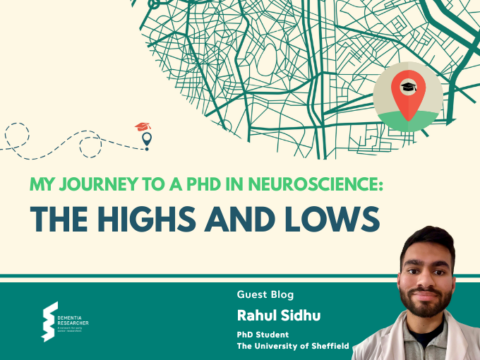Seeing as it’s near the start of the new academic year and as I’m in the final stages of my own PhD I thought it would be the perfect time to start a new blog series all about demystifying the PhD. What are they? How can you find one? What would make your application stand out? These are things you’d never know about a PhD until you do one. So, this month’s blog is going to be all about what exactly a PhD is – because if I’m honest, before I started, I really had no idea of what one was!
A PhD is the highest level of education a person can obtain. It stands for doctor of philosophy and involves mostly independent research on a topic of your choice (a topic of your supervisor’s specialty). In the UK a PhD is 3 to 4 years long (and has a time cap of 4 years if studying full-time). However, the length of a PhD varies depending on where in the world you decide to study.
A PhD can be fully research based – this would be where you apply for an already proposed project. In the UK, to get research funding, supervisors apply for grants and when applying for specific grants they have to propose a project. However, there is definitely scope for the project to change and be altered by your own interests, and it is HIGHLY likely that if you apply for a specific project that this project will change in many ways during your PhD studies.
You can also apply for doctoral training programmes or a DTP for short. These are usually slightly longer than if you apply for a project only PhD (usually 4 years). On some DTPs you have a 1-year period where you complete rotations in different labs to enhance your research skills and to help you decide what you want to research. The final 3 years are for you to complete your own research project. There are many pros to a DTP – you are part of a cohort of students, so you can easily meet and form your own community (which is very important during your PhD).
You also may get the chance to get additional training sessions and networking events depending on the DTP you apply for. However, places on DTPs are exceptionally competitive, so if you want to apply for these sorts of positions, you may need some extra experience on your CV.
What does a PhD involve?
A PhD will likely be nothing like anything you’ve done before. If you’ve completed smaller research projects, such as a dissertation or a MSc research project/placement then the skills you’ve started to develop will certainly help. But, even if you have had previous experience doing research, a PhD will still be something completely new.
Firstly, a PhD will be the ‘most’ independent piece of research you complete. The amount your supervisors are involved will differ between research groups, but it’s likely that you’ll come up with your project ideas independently, create hypotheses independently, plan the methods to be used to collect data, do the data collection, do the analysis, and write up the work independently with some input from your supervisors along the way.
Personally, I found the independence of a PhD really exciting, however, at first (and still at times now) the independence can also be scary – because you are literally doing something you’ve never done before and its potentially something no one else in the world has done before either!
As you can see, during your PhD you will wear many hats – see one of my recent blogs for more information on the different hats you may get to wear.
What are the main stages of a PhD?
For me, one of the most difficult parts of a PhD was knowing what I’d actually be doing and when I’d be doing it. It’s not like other degrees you may have completed, where there is a specific curriculum and you have specific modules, you need to take (although there are some taught aspects on certain PhD degree programmes). So, it can be hard when you first start to know if you’re ‘on track or not’. So here is an average overview of what each year may encompass (obvioulsy this may differ if you’re doing your PhD part-time).
Year 1: Survey the literature, decide what YOU want to research. Write your literature review. Generate your hypotheses. Plan your studies e.g how will you test your hypotheses? You may even begin training on specific techniques that you wish to use in your studies. In the first year there may also be important ethics modules and research skills modules to take. Importantly, at the end of your first year you’ll complete your confirmation review (if you’re at a UK based university). This may take the form of a report, a short presentation or even a mini viva style question session (again this depends on your university!). The point of the confirmation review is to check that you’re on schedule to progress with your research project.
Year 2: Data collection and analysis. Usually, most of the second year is taken up with data collection (especially if you’re doing a lab-based PhD). Getting data, data that is useable can take time, especially if you have to learn lots of new techniques. You may even attend a few conferences in your second year, and start to show some of the work you’re doing.
Year 3: Finishing off data collection, analysis and thesis write-up. As I said, data collection can take time, so don’t be too surprised if you’re still collecting some data in your final year. I’ve heard from many people that some of their best data was collected towards the end of their PhD. In your final year you may also do a large amount of the analysis. Once you’ve collected all that data (and done the important analysis) you’ll need to write it up into a thesis that is assessed by an internal and external examiner. Once you submit your thesis, you’ll be examined in your viva (this usually happens a month or so after you submit your thesis, but does differ depending on your university guidelines). If you’re interested in how to prepare for a viva, check out one of my recent blogs!
How do you pay for a PhD?
I think this is a very important question. I had no idea how PhDs were funded before I started. I never really saw a PhD as an option for myself, as in my head you had to pay for them yourself which I wouldn’t have been able to afford. BUT did you know that many PhDs are actually funded?
In the UK, many supervisors apply for funding to host a PhD student (these are then advertised on websites like findaphd .com and come as ready made projects), and the student completing a PhD receives a PhD stipend. A stipend is a non-taxable payment that you may receive during your PhD. The amount can differ depending on who you are funded by, however, the current minimum stipend you would receive if you’re funded by the UK research institute (UKRI) would be £18,622 (full time). But remember, stipends funded by others can be higher or lower.
If you are accepted onto a studentship project or DTP then your university fees are likely to also be covered by the project funding.
You can also choose to self-fund a PhD. If you self-fund you will need to pay for the tuition fees (approximately £4000 per year in the UK). Additionally, you will also have to pay for your ‘bench fees’ (if you’re a lab researcher). These can range in price (from £1000-£10,000) but are likely to be higher if you decide to complete a lab-based PhD project. People may decide to use savings for this, work part-time or you may be eligible to apply for ‘doctoral loan’ – when you take this approach you will will have more control over the research you do, but will need to find your own supervisor, but also…. you will find supervisors advertising for students who will self-fund.
I hope this blog has given you a little more info about what a PhD may look like if you think you want to complete one at a UK university. Be sure to check out next month’s blog which will be all about how to find PhD projects or DTPs!

Beth Eyre
Author
Beth Eyre is a Postdoctoral Researcher (Dr pending minor corrections) at The University of Sheffield, researching Neurovascular and cognitive function in preclinical models of Alzheimer’s disease. Beth has a background in psychology, where she gained her degree from the University of Leeds. Inside and outside the lab, Beth loves sharing her science and we are delighted to have her contributing as a regular blogger with Dementia Researcher, sharing her work and discussing her career.

 Print This Post
Print This Post




